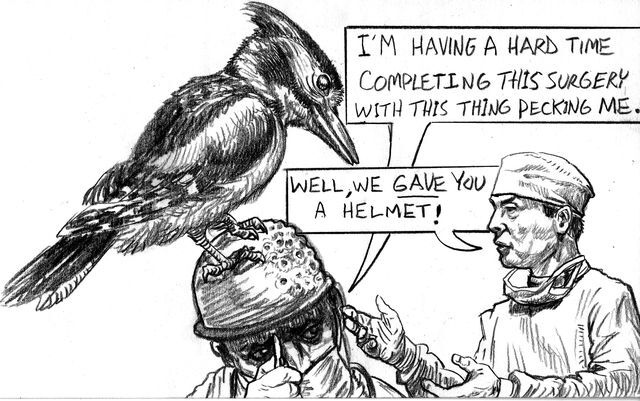The LBJ Student Center use to be a place of classrooms, ballrooms, and eating Chick-fil-A—a peaceful co-existence between each section. Texas State broke this peace by throwing a construction site in the middle of it.
Now, Bobcats who are unfortunate enough to be enrolled in a class in the LBJ Student Center have to endure the loud, disruptive noise happening next door during their class time.
To understand how disruptive this noise can be, imagine for a moment that you are sitting down and listening intently to someone speak and right around the time the person is about to say something important, a third unseen person beats down on a metal sheet with a hammer for a good 30 seconds. Now, as expected, both parties are a bit rattled and lose their train of thought and as soon as they are about begin their conversation again, the third person begins to drill holes into that metal sheet.
This experience is not too far off from the reality that students face taking a class in the LBJ Student Center. This noise affects the learning environment of the classroom adding on to the already stressful task of completing a course. Foot traffic to the Lair has also dropped dramatically because of the limited entrances due to construction. If students are not learning, eating, or working in the LBJ Student Center, then the building is an underused resource for the time being.
Besides being annoying, the construction is also a nightmare for students, staff and faculty with disabilities. The maze of makeshift walkways, stairs and closed entrances make navigation difficult for able-bodied people and nearly impossible for people with disabilities. Even if a student with disabilities can make it to class in LBJ, they would not be able to listen to the lecture because of the noise.
This issue of noise not only affects students but professors as well. English department lecturer Benjamin Reed, who teaches world literature in the LBJ Teaching Theater, is one of such professors.
“Because we are a large and growing community it’s not surprising when some of our many priorities come into conflict with one another,” Reed said. “However, the core objective of any university is the facilitation of teaching and research. After student safety, the ability to listen and cogitate should be the paramount concern. It’s frustrating that this is not always the case, and I’m happy to keep doing what I can to reduce the construction noise in the LBJ teaching theater because I feel strongly that I am protecting the integrity of Texas State University as a student-centered institution.”
Reed also added “On the upside, this experience has been like pedagogical strength training. I feel like I can teach this class anywhere now, like on the shoulder of I-35, or the flight deck of an aircraft carrier.”
Texas State should prioritize the needs of students first. After all, each student has paid a $105 student center fee and for students taking a class in the LBJ Student Center, they are paying an additional pretty penny in tuition fees to take the class.
Students have already provided their end of the deal by paying the fee and showing up to class every day ready to learn. Now it’s time for the university to hold up their end of the bargain and provide a quiet, stable learning environment.
The university could possibly fix this by pausing construction during class time. By starting construction at an earlier time such as 6 to 10 a.m. and stopping during the time when class is heaviest and then continuing from 4 to 8 p.m.. This break could also serve as an extended lunch break for the workers.
The university should act quick to restore the once peaceful co-existence that was once the LBJ Student Center. The day the construction is completed will be glorious, but until then, further measures must be taken to ensure a quality learning environment and common area for student life.
– Otto Bieker is a political science sophomore
Categories:
Student Center construction should pause during class time
October 17, 2018
The university should act quick to restore the once peaceful co-existence that was once the LBJ Student Center.
Illustration by Jeffery Follender
0
Donate to The University Star
Your donation will support the student journalists of Texas State University. Your contribution will allow us to purchase equipment and cover our annual website hosting costs.
More to Discover






